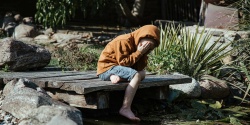Published: 28.09.2023

- The European Commission has published a call for comments on an initiative on integrated child protection systems.
- Consultations with private and public sector actors are due to end on October 20.
- The Ordo Iuris Institute is monitoring the Commission's work on the compatibility of the proposed regulations with the provisions of the Treaties.
- Ordo Iuris is watching the European Commission's work on the project for compliance with EU competencies, as well as monitoring possible initiatives that could push through solutions that currently exist in Germany.
The European Commission has published a call for comments on the initiative on integrated child protection systems (Ref.Ares(2023)4901705-14/07/2023). In the published document, the EC points out that the promotion and protection of children's rights is one of the key objectives set out in the Treaty on European Union. The recent experience of the COVID-19 pandemic has exacerbated challenges and inequalities, increased domestic violence and online child abuse, as well as cyberbullying. In view of these threats, the Commission has pledged to put forward an initiative to promote the development and strengthening of integrated child protection systems, which will encourage all relevant authorities and services to better cooperate in a system that prioritizes children. To this end, the Commission will draw up a recommendation to support Member States in establishing and improving their systems for the protection of wildlife.
Particularly dangerous may be the desire of the European Union to impose the application of the model of solutions adopted in Norway and Germany and to create a "children's office" that would interfere in the lives of Polish families. Many years of observation of the functioning of such a model, including the establishment of the Norwegian Barnevernet office or the German Jugendamt, shows the dysfunctionality of such solutions and the destructive effects on families in the long-term perspective. The Ordo Iuris Institute has already successfully intervened more than once in cases concerning the protection of parents' rights violated by these institutions, including before the Strasbourg Court. A series of rulings by the Court shows unequivocally that the Norwegian authority violates the rights of parents who find themselves in difficult life situations, their children are taken away from them and transferred to foster families, without giving them a chance to improve. It is the duty of the state to create conditions and a suitable environment for rebuilding the bond between biological parents and the child. This shows that the model on which Norway and Germany, among others, based their family policies is becoming a systemic problem of respect for parents' rights.
The functioning of the aforementioned institutions has also been criticized by the European Parliament, which in 2018 adopted a resolution condemning the German state's discrimination against parents from other countries, and criticizing the unfounded separation of children from their parents. Also, the Council of Europe has criticized the actions of member states in failing to respect children's rights to ensure an unbreakable bond with their parents and the need to ensure judicial control over welfare offices. Ordo Iuris points out that it would therefore be definitely unacceptable to introduce such solutions on Polish soil, which is what the European Commission is trying to achieve by limiting the competence of individual member states in this regard.
In the Institute's opinion, the European Commission's actions on new initiatives should be preceded by an analysis and review of the existing law, an assessment of the necessity of introducing new solutions at the EU level and a detailed determination of the potential effects of introducing new regulations, and in the discussed context - the protection of children's rights. Therefore, the Institute notes the need for the Commission to address and analyze the following issues: protection of the physical integrity of the child, ensuring an environment that is friendly to the relationship between parents and children, stricter penalties for those convicted of child abuse, protection of children from cyberbullying, limiting access to pornography, protection of unborn children, protection of children's mental health, prohibition of so-called "transitions" in minors. transitions in minors, dialogue and relationship-building among peers, banning advertising with children, curbing child trafficking, tightening penalties for groups involved in child sex trafficking or coercing children into labor.
- The welfare of the child is a value that must be protected in a special way. It should be clearly emphasized that current EU legislation and the national laws of the Member States already sufficiently define this matter and provide effective and efficient safeguards for the interests and rights of the child. Of particular concern may be the fact that the European Commission will seek to interfere with national legal orders by limiting the rights of parents. Possible solutions proposed by the Commission must have a comprehensive dimension, taking into account the systems and institutions already in place, as well as the diversity of societies in individual member states," noted Dr. Przemysław Kulawinski of the Ordo Iuris Center for International Law.
The Institute will monitor the work on the project. If it turns out that the EU's competencies are being exceeded, Ordo Iuris will prepare an appropriate opinion regarding the indicated issue and a proposal for possible solutions. A final assessment can be made after the European Commission presents the draft.

17.04.2025
• The Ordo Iuris Institute has prepared an opinion for the UN as part of a thematic report on surrogacy and its impact on the rights of women and children.

03.04.2025
• The Advocate General of the Court of Justice of the European Union (CJEU) has issued an opinion in a case involving a same-sex couple’s demand for their German marriage to be recognized as a marriage in Poland.

24.03.2025
On the 81st anniversary of the martyrdom of the Ulma family and the Jews they sheltered—who died at the hands of the German occupiers of Poland—the Ordo Iuris Institute is releasing a special commemorative infographic.

21.03.2025
• An Iranian national granted asylum in Hungary requested that her registered female gender be changed to male, indicating that she is transgender. Her request was denied due to the lack of surgical gender reassignment.